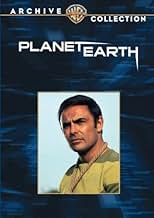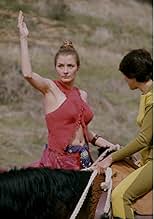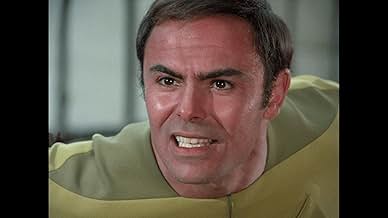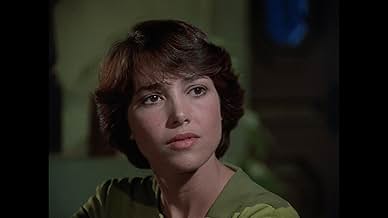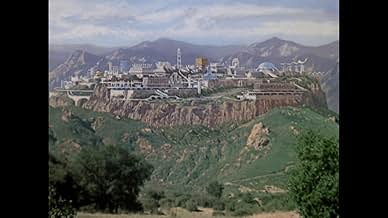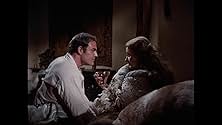VALUTAZIONE IMDb
5,7/10
952
LA TUA VALUTAZIONE
Aggiungi una trama nella tua linguaA 20th Century man wakes up in 2133, where men are slaves and women rule.A 20th Century man wakes up in 2133, where men are slaves and women rule.A 20th Century man wakes up in 2133, where men are slaves and women rule.
- Regia
- Sceneggiatura
- Star
Jo de Winter
- Villar
- (as Johana De Winter)
Corinne Camacho
- Bronta
- (as Corrine Camacho)
Sue Dahlman
- Thetis
- (as Sara Chattin)
Robert Sutton
- Kreeg Captain
- (as Raymond Sutton)
Recensioni in evidenza
Yet another of Gene Roddenberry's post-'Star Trek' attempts at a series, 'Planet Earth' is generally agreeable entertainment, although nothing special. It gets most of its juice from its digs at sexual politics. Obviously low-budget, it doesn't feature much in the way of futuristic environments, or costumes, or special effects. It is definitely fun in a cheesy, well-meaning sort of way, and it does NOT skimp on sex appeal, with appropriate eye candy for men and women alike.
The almighty John Saxon stars as Dylan Hunt, a man who went into suspended animation in 1979, and was awakened in the 22nd century. Now, a post-"conflict" Earth is divided into societies both advanced and primitive. One such society is matriarchal in nature, with all the males kept drugged up and submissive. The virile, studly Hunt is considered good breeding stock by these women. One lady in particular, Marg (Diana Muldaur, who went on to a role on 'Star Trek: The Next Generation' the following decade), is especially taken with Hunt.
A rich cast of familiar faces (Janet Margolin, Ted Cassidy, Christopher Cary, Majel Barrett, Jim Antonio, John Quade) helps to make this easy enough to watch, even though it's just as easy to forget. One good thing about TV movies from this era is their brief running times, so there's less chance of them wearing out their welcome. 'Planet Earth' is adequately paced, but its real strongest suit is its sense of humour. As I already said, some of the cast members are very attractive, so that helps as well; Muldaur is quite striking as the leader of these women.
One thing this viewer liked was the idea that all major population centres on Earth are connected by these underground tunnels, through which Hunt and others travel as if they were subways.
Six out of 10.
The almighty John Saxon stars as Dylan Hunt, a man who went into suspended animation in 1979, and was awakened in the 22nd century. Now, a post-"conflict" Earth is divided into societies both advanced and primitive. One such society is matriarchal in nature, with all the males kept drugged up and submissive. The virile, studly Hunt is considered good breeding stock by these women. One lady in particular, Marg (Diana Muldaur, who went on to a role on 'Star Trek: The Next Generation' the following decade), is especially taken with Hunt.
A rich cast of familiar faces (Janet Margolin, Ted Cassidy, Christopher Cary, Majel Barrett, Jim Antonio, John Quade) helps to make this easy enough to watch, even though it's just as easy to forget. One good thing about TV movies from this era is their brief running times, so there's less chance of them wearing out their welcome. 'Planet Earth' is adequately paced, but its real strongest suit is its sense of humour. As I already said, some of the cast members are very attractive, so that helps as well; Muldaur is quite striking as the leader of these women.
One thing this viewer liked was the idea that all major population centres on Earth are connected by these underground tunnels, through which Hunt and others travel as if they were subways.
Six out of 10.
PLANET EARTH and GENESIS 2 were fun pilots. PLANET EARTH was set on a earth after a nuclear war yet, was ahead of it's time. It's a shame roddenberry couldn't get a syndication deal like Gerry Anderson of SPACE 1999. Syndication would have helped this show more than network airings.
In his book "Star Trek Movie Memories" William Shatner describes Roddenberry's career in the early 70's.
With regards to "Planet Earth", it's stated that the network passed on the series because it was felt that it could only afford 1 expensive science fiction television series.
The other choice was "Planet of the Apes". Because of the franchise success of the "Apes" films, it was felt by network bigwigs that an "Apes" TV series was the better bet and had more of a chance of being a hit.
As it turned out, the "Apes" series tanked after 13 episodes.
Hal
With regards to "Planet Earth", it's stated that the network passed on the series because it was felt that it could only afford 1 expensive science fiction television series.
The other choice was "Planet of the Apes". Because of the franchise success of the "Apes" films, it was felt by network bigwigs that an "Apes" TV series was the better bet and had more of a chance of being a hit.
As it turned out, the "Apes" series tanked after 13 episodes.
Hal
This might be enjoyed best as a review of 40-year old television effort. Gene Roddenberry is best remembered for Star Trek, but this Air Force veteran was writing well before the 1966 show hit the airwaves.
"Planet Earth" can be enjoyed on its own, but I got the opportunity to watch "Genesis II" first. Both these television pilots are based on the same story of a scientist suspended in time for 160 years. The world has mostly destroyed itself and we're invited for a collection of never-to-appear stories of the survivors bringing mankind back.
This story premise and those from Star Trek pivot on some type of Third World War wiping about most of our civilization. While Star Trek plots all seems to share the idea that mankind has evolved into a better kind of person, Planet Earth did not display that sensation to me; and maybe that's the problem. The illusion of an improved man seemed to led the following of Trekkers, plus the boundless story opportunities of visiting other planets. There was no way to expect that sense of wonderness with this story. Even though this future is probably a truer presentation of mankind following such a war, people like illusions and the lies to make us feel better.
Also interesting to see is the kind of loyalty Roddenberry has with actors. Like using DeForest Kelley, Leonard Nimoy, Nichelle Nichols and Majel Barrett (who he later married) on previous projects and then including them in Star Trek, Planet Earth cast includes Star Trek Alumni Diana Muldaur, Ted Cassidy and of course Majel.
I don't recall seeing either of the pilots (Genesis II or Planet Earth) in 1974 but I'm fairly sure I wouldn't been very intrigued by them. Roddenberry's humanists views are quite evident in all his material, which can make it difficult to fully engage in his stories. Star Trek, for the most part, worked well -- Planet Earth didn't. John Saxon acting and fight-scenes are better in other productions. Diana Muldaur is a very strong actress with great presence, but her character here was tiresome and I just wanted her to go away. I was looking forward to anything interesting for Ted Cassidy, but we barely see him.
So if you're interested in shows from the 70s or in Roddenberry, watch Planet Earth and possible Genesis II, but don't be disappointed that a new story franchise was not born.
"Planet Earth" can be enjoyed on its own, but I got the opportunity to watch "Genesis II" first. Both these television pilots are based on the same story of a scientist suspended in time for 160 years. The world has mostly destroyed itself and we're invited for a collection of never-to-appear stories of the survivors bringing mankind back.
This story premise and those from Star Trek pivot on some type of Third World War wiping about most of our civilization. While Star Trek plots all seems to share the idea that mankind has evolved into a better kind of person, Planet Earth did not display that sensation to me; and maybe that's the problem. The illusion of an improved man seemed to led the following of Trekkers, plus the boundless story opportunities of visiting other planets. There was no way to expect that sense of wonderness with this story. Even though this future is probably a truer presentation of mankind following such a war, people like illusions and the lies to make us feel better.
Also interesting to see is the kind of loyalty Roddenberry has with actors. Like using DeForest Kelley, Leonard Nimoy, Nichelle Nichols and Majel Barrett (who he later married) on previous projects and then including them in Star Trek, Planet Earth cast includes Star Trek Alumni Diana Muldaur, Ted Cassidy and of course Majel.
I don't recall seeing either of the pilots (Genesis II or Planet Earth) in 1974 but I'm fairly sure I wouldn't been very intrigued by them. Roddenberry's humanists views are quite evident in all his material, which can make it difficult to fully engage in his stories. Star Trek, for the most part, worked well -- Planet Earth didn't. John Saxon acting and fight-scenes are better in other productions. Diana Muldaur is a very strong actress with great presence, but her character here was tiresome and I just wanted her to go away. I was looking forward to anything interesting for Ted Cassidy, but we barely see him.
So if you're interested in shows from the 70s or in Roddenberry, watch Planet Earth and possible Genesis II, but don't be disappointed that a new story franchise was not born.
If you're an obscure-movie buff like me, find "Planet Earth" and watch it. I loved it. It's sexually suggestive, it's got mutants, underground trains connecting the whole Earth, mystics and doctors and it's totally entertaining. John Saxon as Dylan Hunt is very expressive, and I swear I could watch it again and again. In a way, it's very much a prequel to Enterprise and follows suit with the usual Roddenberry ideologies. In fact, all the acting is good. Look for Gene Roddenberry's wife in the face of extras, as well as a few other recognizables. Diana Muldaur (who later played Dr Pulanski in The Next Generation) is very attractive as the domineering slave-trader and I find myself envying John Saxon in certain parts of the film - well, see for yourself! A great 60 minute flick!
Lo sapevi?
- QuizThe plot was based on a story premise for 'Genesis II' called "The Poodle Shop", which was in turn based on an unused story idea ("The Pet Shop") in Gene Roddenberry's original pitch for Star Trek (1966).
- ConnessioniFollows Genesis II (1973)
I più visti
Accedi per valutare e creare un elenco di titoli salvati per ottenere consigli personalizzati
Dettagli
Contribuisci a questa pagina
Suggerisci una modifica o aggiungi i contenuti mancanti

Divario superiore
By what name was Pianeta Terra (1974) officially released in India in English?
Rispondi
